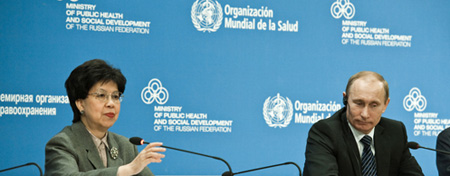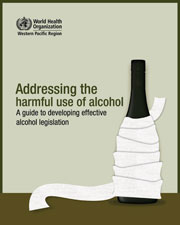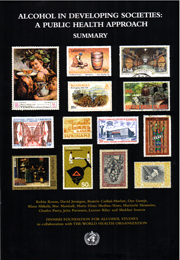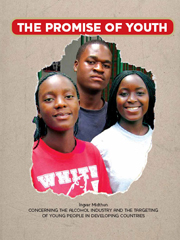Updated 3 May with links to video reports from the First Global Ministerial Conference on Healthy Lifestyles and Noncommunicable Disease Control.
The Moscow WHO Global Forum 27 April brought together a wide group of stakeholders to share views and experiences on the challenges and opportunities in noncommunicable disease (NCD) prevention, treatment and control. The forum participants discussed the challenges of NCDs, their expectations for outcomes of the September 2011 UN High-level Meeting (HLM) on NCDs and their possible contributions in support of NCD prevention and control.
The WHO Global Forum provided an opportunity for civil society to give inputs to the First global ministerial conference on healthy lifestyles and noncommunicable disease control held in Moscow 28-29 April.

WHO DG Margaret Chan with Russian Prime Minister Vladimir Putin
WHO Director-General, Dr Margaret Chan addressed the participants in the Global Forum. She said "The rise of chronic noncommunicable diseases presents public health with an enormous challenge. For some countries, it is no exaggeration to describe the situation as an impending disaster. I mean a disaster for health, for society, and most of all for national economies." She also pointed out that the battle to control noncommunicable diseases is a different kind of fight from fighting infectious disease: "Our standard job, things like getting essential medicines to people, taking care of them in hospitals, have become so massively demanding and so massively costly that they threaten the solvency of even the wealthiest health care systems. Everyone agrees that prevention is by far the better option."
Dr. Chan said that policies that promote unhealthy lifestyles throughout entire populations are made in domains beyond the direct control of health. She pointed out that today, many of the threats to health that contribute to noncommunicable diseases come from corporations that are big, rich and powerful, driven by commercial interests, and far less friendly to health. The WHO DG was adamant that we can forget collaboration with the tobacco industry. Implementation of the Framework Convention on Tobacco Control (FCTC) is essential.
The stakeholder's contributions' were given in six concurrent sessions. Those sessions fed into the plenary discussion where inputs were noted by the rapporteur, Sir Michael Hurst, President Elect, International Diabetes Federation, who was assigned to report to the ministerial conference. Sir Hurst’s summary at the end of the Forum, included the following points:
- Challenge to bring together many sectors – NCDs is not only a health system challenge
- Leadership is needed, in Governments as well as in/among NGOs, private sectors, general public
- Need targets and benchmarks and measure progress
- Engagement of all stakeholders necessary
Moscow Declaration
Ministers and national delegations from some 94 member states participated in First Global Ministerial Conference on Healthy Lifestyles and Noncommunicable Disease Control. A final Moscow declaration was negotiated and launched on the last day of the meeting.
The declaration recognises that NCDs have substantial negative impacts on human development and may impede progress towards the Millennium Development Goals (MDGs). The Ministers who met in Moscow note that policies that address the behavioural, social, economic and environmental factors associated with NCDs should be rapidly and fully implemented. They point out that examples of cost-effective interventions to reduce the risk of NCDs, which are affordable in low-income countries and could prevent millions of premature deaths every year, include measures to control tobacco use, reduce salt intake and reduce the harmful use of alcohol.
The declaration includes commitment to action including “Implementing cost-effective policies, such as fiscal policies, regulations and other measures to reduce common risk factors such as tobacco use, unhealthy diet, physical inactivity and the harmful use of alcohol;” The declaration commits to accelerating implementation by States Parties of the provisions of the WHO Framework Convention on Tobacco Control (WHO FCTC) and it point out the need to “Implementing effective policies for NCD prevention and control at national and global levels, including those relevant to achieving the goals of the 2008-2013 Action Plan for the Global Strategy for the Prevention and Control of Noncommunicable Diseases, the WHO Global Strategy to Reduce the Harmful Use of Alcohol and the Global Strategy on Diet, Physical Activity and Health;”
At the international level the ministers agree to "Strengthening international support for the full and effective implementation of the WHO FCTC, the Action Plan for the Global Strategy for the Prevention and Control of Noncommunicable Diseases, the WHO Global Strategy to Reduce the Harmful Use of Alcohol, the Global Strategy on Diet, Physical Activity and Health and other relevant international strategies to address NCDs."
More information:
Read Dr. Margaret Chan's opening speech at the WHO Global Forum
Download the Moscow Declaration
WHO information page about the process towards the United Nations High Level Meeting NCD in New York
Video recordings from the Moscow Global Ministerial Conference:
Overview of video clips
Roundtables: Harmful use of alcohol - Includes following speakers:
- Ghulam Nabi Azad, Minister of Health and Family Welfare, India
- Harvey V. Fineberg, President, Institute of Medicine, USA
- Jürgen Rehm, Professor, Division Epidemiology, University of Toronto
- John Seakgosing, Minister of Health, Botswana
- Hanno Pevkur, Minister of Social Affairs, Estonia
- Siriwat Tiptaradol, Deputy Permanent Secretary, Ministry of Public Health, Thailand
- Pascal Strupler, Secrétaire d'Etat, Office fédéral de la Santé publique, Switzerland
- Questions from the audience
- End session remarks
Videoreports on YouTube:
WHO: Unite in the fight against NCDs
2011 UN NCDs summit: the European story
WHO: Global Noncommunicable Disease Network


![]()
![]()




